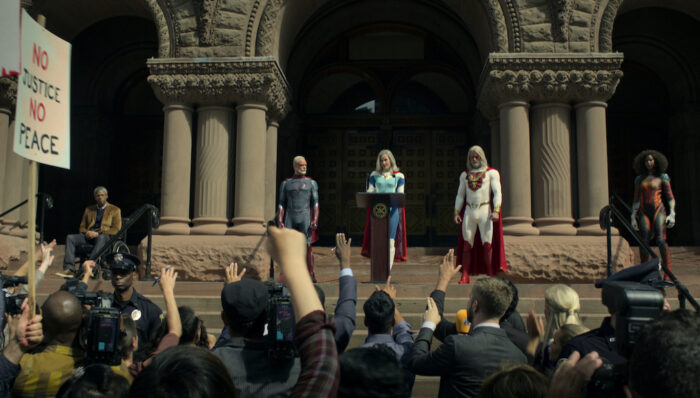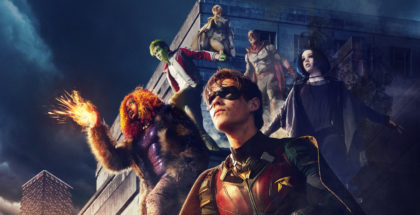Netflix UK TV review: Jupiter’s Legacy
Review Overview
Cast
7Action
7Pacing
4David Farnor | On 09, May 2021
“We have these powers for a reason. And with great power comes…” “Great responsibility.” “No. Well, yeah.” That’s the sound of Sheldon Sampson, aka. The Utopian (Josh Duhamel), talking to his daughter, Chloe (Elena Kampouris), in Jupiter’s Legacy, Netflix’s new series about superheroes trying to reckon with their moral duty while passing the torch from one generation to the next. A sideways look at superheroes and the pressures of living up to your parents’ legacy? If Jupiter’s Legacy sounds familiar, that’s because it is – arriving hot on the heels of Amazon series Invincible and The Boys, it plays like a cross between the two.
The series is based on the the comic books by Mark Millar and Frank Quitely, and marks Netflix’s ongoing strategy of using Millarworld’s IP to build its own superhero franchises. The only problem is that it struggles to carve out new ground in a genre that’s increasingly populated – and, moreover, populated by shows that have found striking new ways to examine age-old ideas. Not as outrageously satirical as The Boys, less violent that Invincible and less subversive and timely than Watchmen, what Jupiter’s Legacy instead has to offer is straight-laced earnestness. Because while there are generous helpings of sex, violence and dark secrets, underneath that gory 15-certificate surface is a show that takes itself seriously – and offers a heartfelt exploration of family and loyalty. (Showrunner Stephen S DeKnight’s previous work ranges from Daredevil to Pacific Rim: Uprising.)
The main focus lands on Sheldon and Brandon, aka. Paragon (Andrew Horton), his son and the apparent heir to the moniker of The Utopian. But in the first episode, a surprise attack by escaped-from-max-security-prison villain Blackstar (Tyler Man) puts Sheldon in mortal danger, and Paragon ends up killing Blackstar to save his father. While Brandon feels he did the right thing, Sheldon couldn’t be more disappointed: Brandon’s behaviour broke the no-kill code that Sheldon introduced when he formed the Union of Justice (the superhero league that aims to do good in the world).
There’s an interesting juxtaposition of old-fashioned moral values with a younger generation where things are less clear-cut: in today’s world, it becomes clear that people have to choose not between doing the right or wrong thing, but between killing or being killed. And, to make things juicier, the wider society seems to agree with Brandon, leaving the ageing Sheldon, his wife, Grace aka. Lady Liberty (Leslie Bibb), and his brother, Walt aka. Brainwave (Ben Daniels), looking out of date and out of touch.
All of this is intercut with the tale of how Sheldon, Grace and Walt first got their powers, whisking us back to the 1930s where Sheldon and Walter work for their father’s steel empire but find their dad wasn’t the man they thought. While there should be a nice through-line here in meditations on fathers and sons, and legacies and living up to expectations, the show slightly fumbles the back-and-forth; while the period production design (and juggling of aspect ratios) is often gorgeous, the slow build-up to the onset of their abilities (which involves a trek to a mysterious island) is so gradually paced that it drags down the whole season’s momentum.
Indeed, it’s telling that the most intriguing part about the flashbacks is George aka. Skyfox (Matt Lanter), Sheldon’s best friend whom we hear about in hindsight, as Sheldon and Walt lament the way that he turned against the rest of them. But with the resolution of that much-teased fallout not resolved until the finale, the drip-feed of details tests your patience rather than draws you in.
Fortunately, the rest of the modern-day drama is much more successful and engaging. That’s not necessarily because of Sheldon and Brandon’s disagreements, which can get a bit repetitive despite Duhamel and Horton’s performances, but in the scene-stealing turn from Kampouris as Chloe, the wayward child who finds her own way in life away from the Union – a way of life that involves modelling, partying and getting to know Hush (Ian Quinlan), whose powers involve a stick reminiscent of George’s abilities and are used with a witty, thrilling unpredictability.
The action, too, is impressively choreographed, managing to find distinctive ways to shape each set piece around each character’s skills and weapons – the Blackstar showdown in the opening episode is particularly spectacular, while the climactic showdown is wonderfully layered. But the dust-ups are sprinkled across the eight episodes and, coupled with the serious tone, means that Jupiter’s Legacy lacks the impact it needs to be a super success. There’s potential here for real sparks to fly in a second season, but the question is whether people will get all the way through the first. With great powers come great responsibility – but a bit of fun wouldn’t go amiss either.
Jupiter’s Legacy is available on Netflix UK, as part of an £9.99 monthly subscription.




















